外研版 英语 必修二 Module 4 Fine Arts Language points课件(17张ppt)
文档属性
| 名称 | 外研版 英语 必修二 Module 4 Fine Arts Language points课件(17张ppt) | 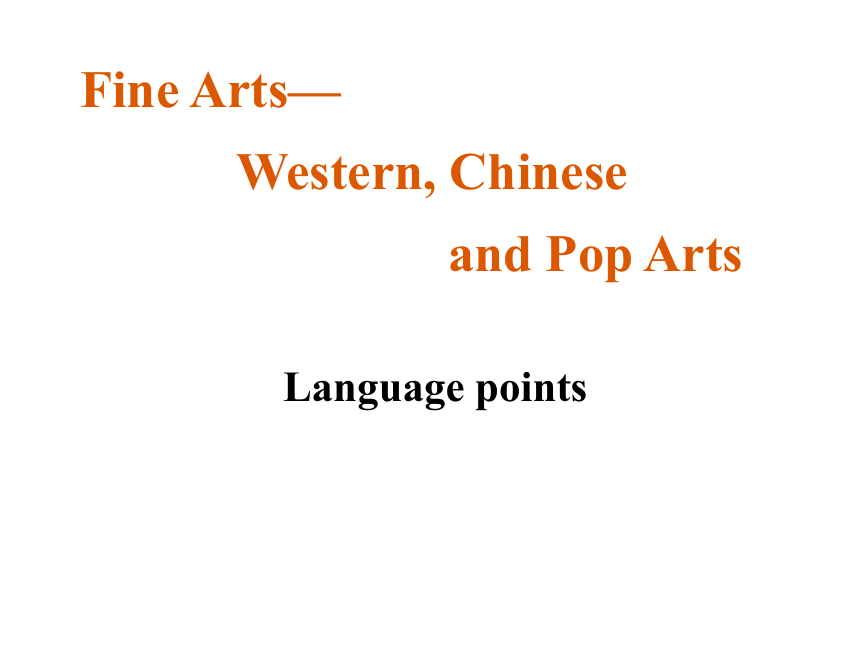 | |
| 格式 | ppt | ||
| 文件大小 | 444.5KB | ||
| 资源类型 | 教案 | ||
| 版本资源 | 外研版 | ||
| 科目 | 英语 | ||
| 更新时间 | 2021-02-23 13:28:11 | ||
图片预览

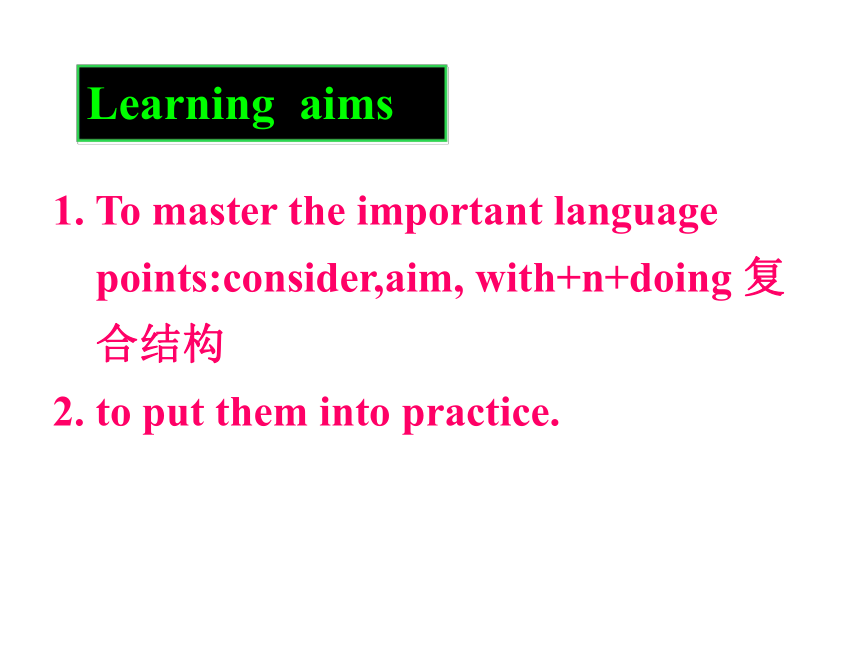
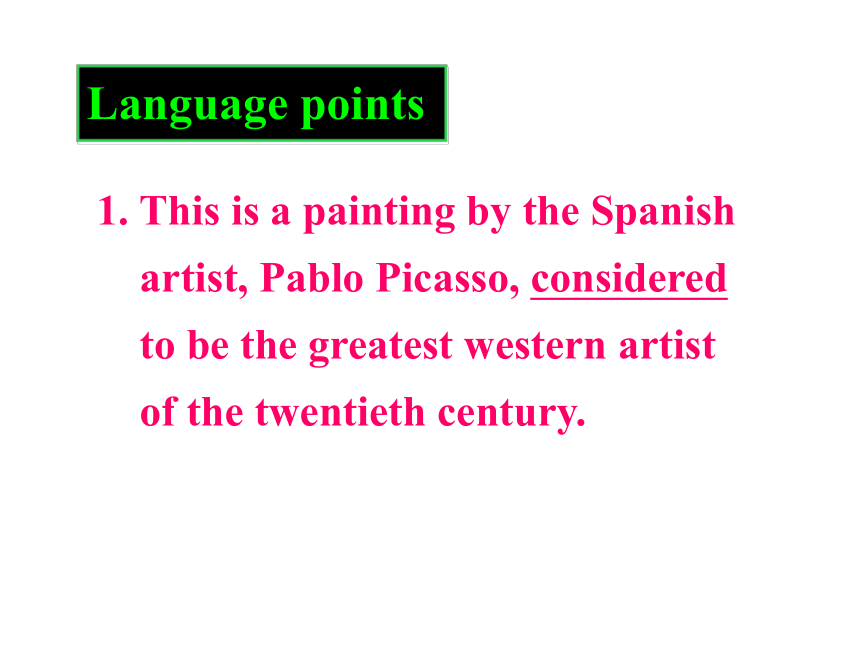
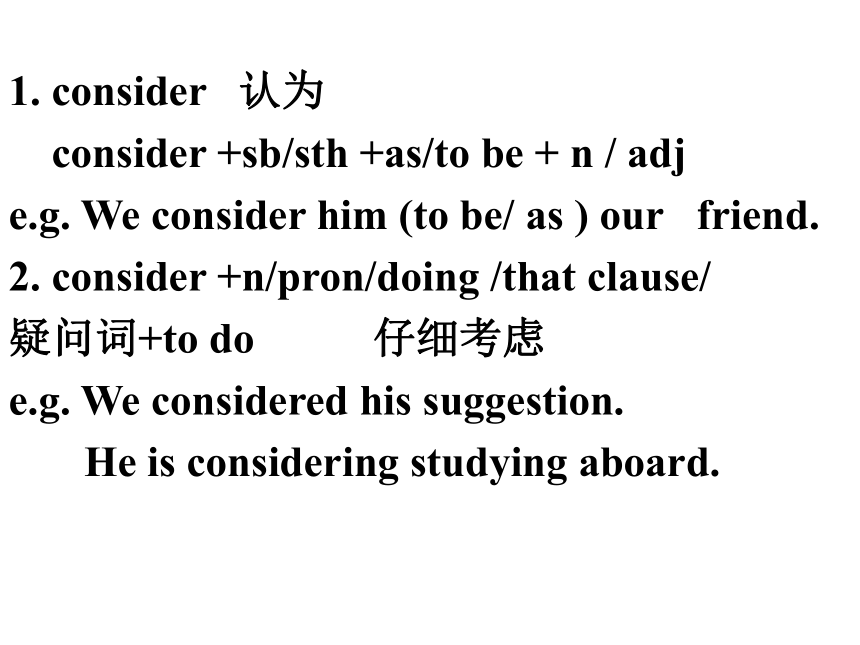
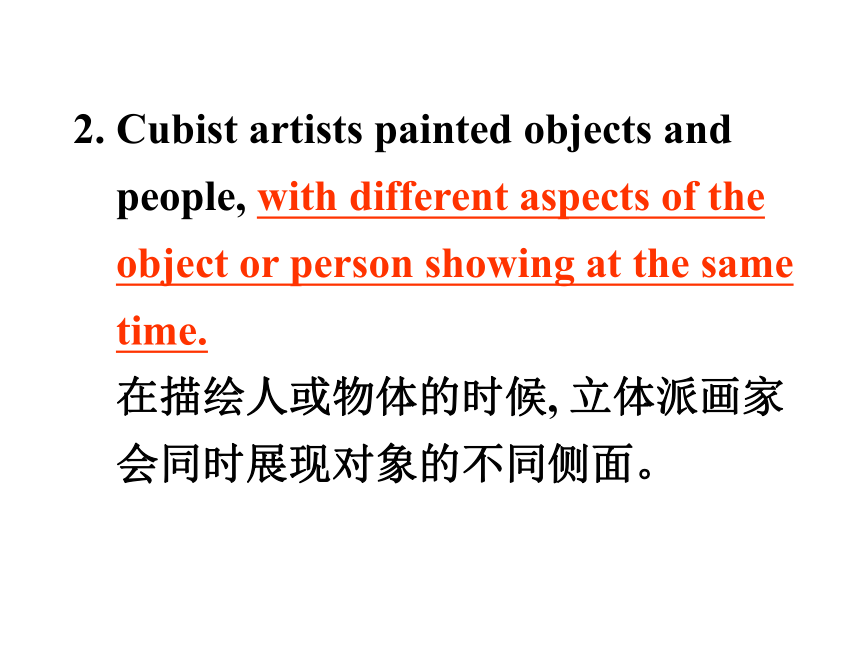
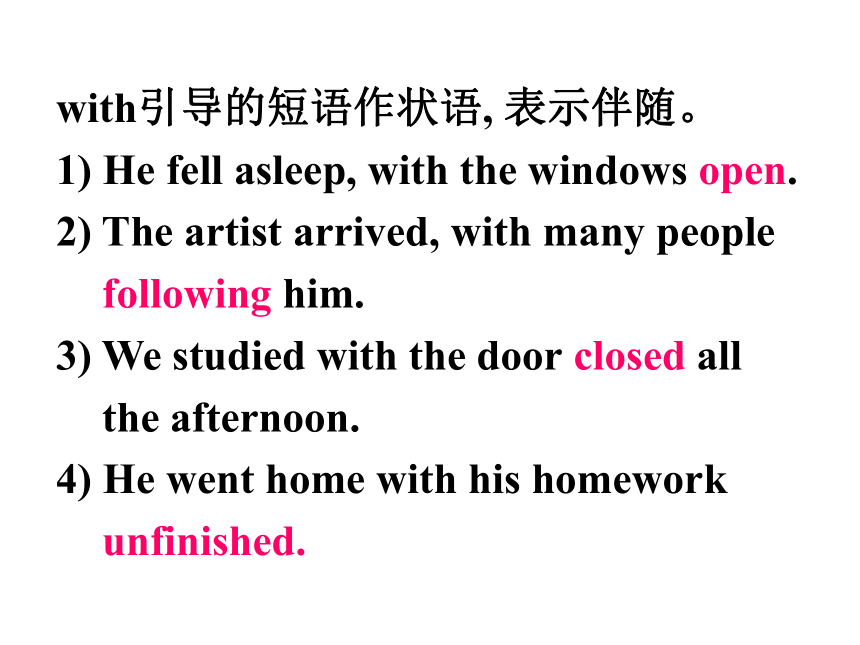
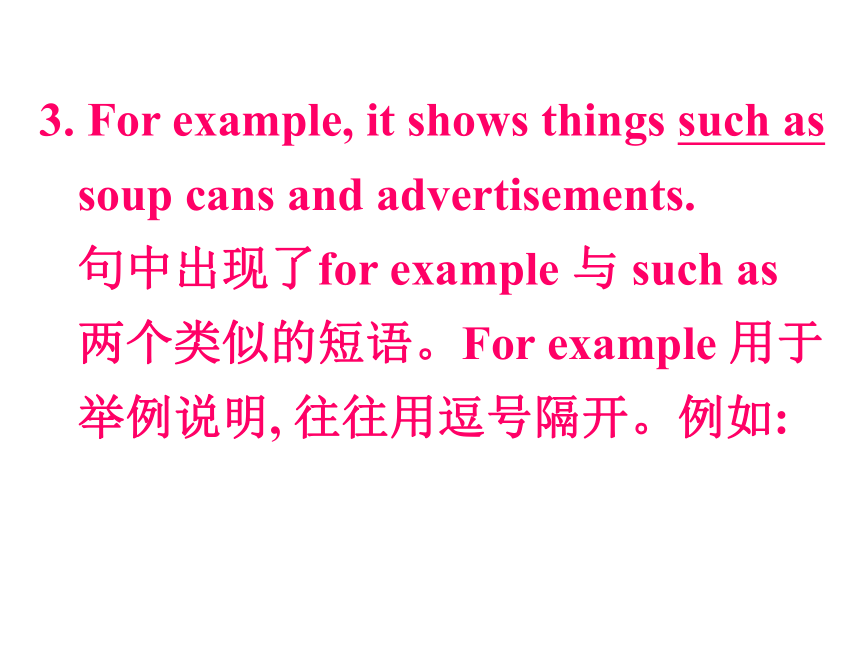
文档简介
Fine Arts—
Western, Chinese
and Pop Arts
Language points
Learning aims
1. To master the important language points:consider,aim, with+n+doing 复合结构
2. to put them into practice.
Language points
1. This is a painting by the Spanish artist, Pablo Picasso, considered to be the greatest western artist of the twentieth century.
1. consider 认为
consider +sb/sth +as/to be + n / adj
e.g. We consider him (to be/ as ) our friend.
2. consider +n/pron/doing /that clause/
疑问词+to do 仔细考虑
e.g. We considered his suggestion.
He is considering studying aboard.
2. Cubist artists painted objects and people, with different aspects of the object or person showing at the same time.
在描绘人或物体的时候, 立体派画家会同时展现对象的不同侧面。
with引导的短语作状语, 表示伴随。
1) He fell asleep, with the windows open.
2) The artist arrived, with many people following him.
3) We studied with the door closed all the afternoon.
4) He went home with his homework unfinished.
3. For example, it shows things such as soup cans and advertisements.
句中出现了for example 与 such as 两个类似的短语。For example 用于举例说明, 往往用逗号隔开。例如:
Many great people have risen from poverty. For example, Lincoln and Edison.
而such as 用于列举。例如:
eg: We study many subjects, such as English, maths and physics.
4. Instead, a picture should try to show the “life” of its subject.
相反, 一幅画应该努力表现对象的生命
instead adv.意思是“代替, 反而, 而”。放在句子用逗号隔开; 或放在句子后面
e.g. He is tired, and let me go instead.
She never studies. Instead, she plays
all day.
拓展
instead of 取代, 而不……
e.g. I will go to New Zealand instead of Japan. 我打算去新西兰而不是日本。
We intended to have our breakfast in the garden instead of in the dinning room. 我们打算在花园而不在餐厅吃早饭。
注意: instead of 与 instead 的相互转换
例如: 我们要去青岛而不是大连度假。
We’ll go to Qingdao instead of Dalian for a holiday.
或: We’ll not go to Dalian. Instead,
we’ll go to Qingdao for a holiday.
5. He is most famous for his lively paintings of horses.
most +形容词或副词, 前面不加the时, 其意思为“非常”。如;
I am most pleased with your answer.
6. But I can’t stand that picture of a golden- haired girl.
stand忍受, 后接名词,代词或动词-ing形式。常用于疑问句和否定句中。如: He can’t stand working in the extreme heat for several hours.
Stand by 袖手旁观
Stand out 突出,出色
6. My parents are fond of going to art galleries and often take me with them, so I’ve developed an interest in art.
Be fond of 喜欢后跟名词代词动名词
She was fond of speaking French.
go to+ an activity 参加某种活动。后接不同的名词, 汉语译法不同。如:
1) He went to an important meeting yesterday.
2) We are going to an exhibition tomorrow.
3) Would you like to go to the concert with me?
1. 参加 2. 参观 3.听
7. I can tell by the style.
style: n. 风格;样式;文体
e.g: It’s the painting in the style of Picasso. 这是一幅毕加索风格的油画。
The letter was written in a formal style.
该信是用正式文体写的。
8. I think he’s an extraordinary artist. 我认为他是一个了不起的艺术家。
extraordinary adj. 不平常的, 格外的, 特别的
His talents are quite extraordinary. 他才华出众。
an extraordinary general meeting 特别全会
Western, Chinese
and Pop Arts
Language points
Learning aims
1. To master the important language points:consider,aim, with+n+doing 复合结构
2. to put them into practice.
Language points
1. This is a painting by the Spanish artist, Pablo Picasso, considered to be the greatest western artist of the twentieth century.
1. consider 认为
consider +sb/sth +as/to be + n / adj
e.g. We consider him (to be/ as ) our friend.
2. consider +n/pron/doing /that clause/
疑问词+to do 仔细考虑
e.g. We considered his suggestion.
He is considering studying aboard.
2. Cubist artists painted objects and people, with different aspects of the object or person showing at the same time.
在描绘人或物体的时候, 立体派画家会同时展现对象的不同侧面。
with引导的短语作状语, 表示伴随。
1) He fell asleep, with the windows open.
2) The artist arrived, with many people following him.
3) We studied with the door closed all the afternoon.
4) He went home with his homework unfinished.
3. For example, it shows things such as soup cans and advertisements.
句中出现了for example 与 such as 两个类似的短语。For example 用于举例说明, 往往用逗号隔开。例如:
Many great people have risen from poverty. For example, Lincoln and Edison.
而such as 用于列举。例如:
eg: We study many subjects, such as English, maths and physics.
4. Instead, a picture should try to show the “life” of its subject.
相反, 一幅画应该努力表现对象的生命
instead adv.意思是“代替, 反而, 而”。放在句子用逗号隔开; 或放在句子后面
e.g. He is tired, and let me go instead.
She never studies. Instead, she plays
all day.
拓展
instead of 取代, 而不……
e.g. I will go to New Zealand instead of Japan. 我打算去新西兰而不是日本。
We intended to have our breakfast in the garden instead of in the dinning room. 我们打算在花园而不在餐厅吃早饭。
注意: instead of 与 instead 的相互转换
例如: 我们要去青岛而不是大连度假。
We’ll go to Qingdao instead of Dalian for a holiday.
或: We’ll not go to Dalian. Instead,
we’ll go to Qingdao for a holiday.
5. He is most famous for his lively paintings of horses.
most +形容词或副词, 前面不加the时, 其意思为“非常”。如;
I am most pleased with your answer.
6. But I can’t stand that picture of a golden- haired girl.
stand忍受, 后接名词,代词或动词-ing形式。常用于疑问句和否定句中。如: He can’t stand working in the extreme heat for several hours.
Stand by 袖手旁观
Stand out 突出,出色
6. My parents are fond of going to art galleries and often take me with them, so I’ve developed an interest in art.
Be fond of 喜欢后跟名词代词动名词
She was fond of speaking French.
go to+ an activity 参加某种活动。后接不同的名词, 汉语译法不同。如:
1) He went to an important meeting yesterday.
2) We are going to an exhibition tomorrow.
3) Would you like to go to the concert with me?
1. 参加 2. 参观 3.听
7. I can tell by the style.
style: n. 风格;样式;文体
e.g: It’s the painting in the style of Picasso. 这是一幅毕加索风格的油画。
The letter was written in a formal style.
该信是用正式文体写的。
8. I think he’s an extraordinary artist. 我认为他是一个了不起的艺术家。
extraordinary adj. 不平常的, 格外的, 特别的
His talents are quite extraordinary. 他才华出众。
an extraordinary general meeting 特别全会
